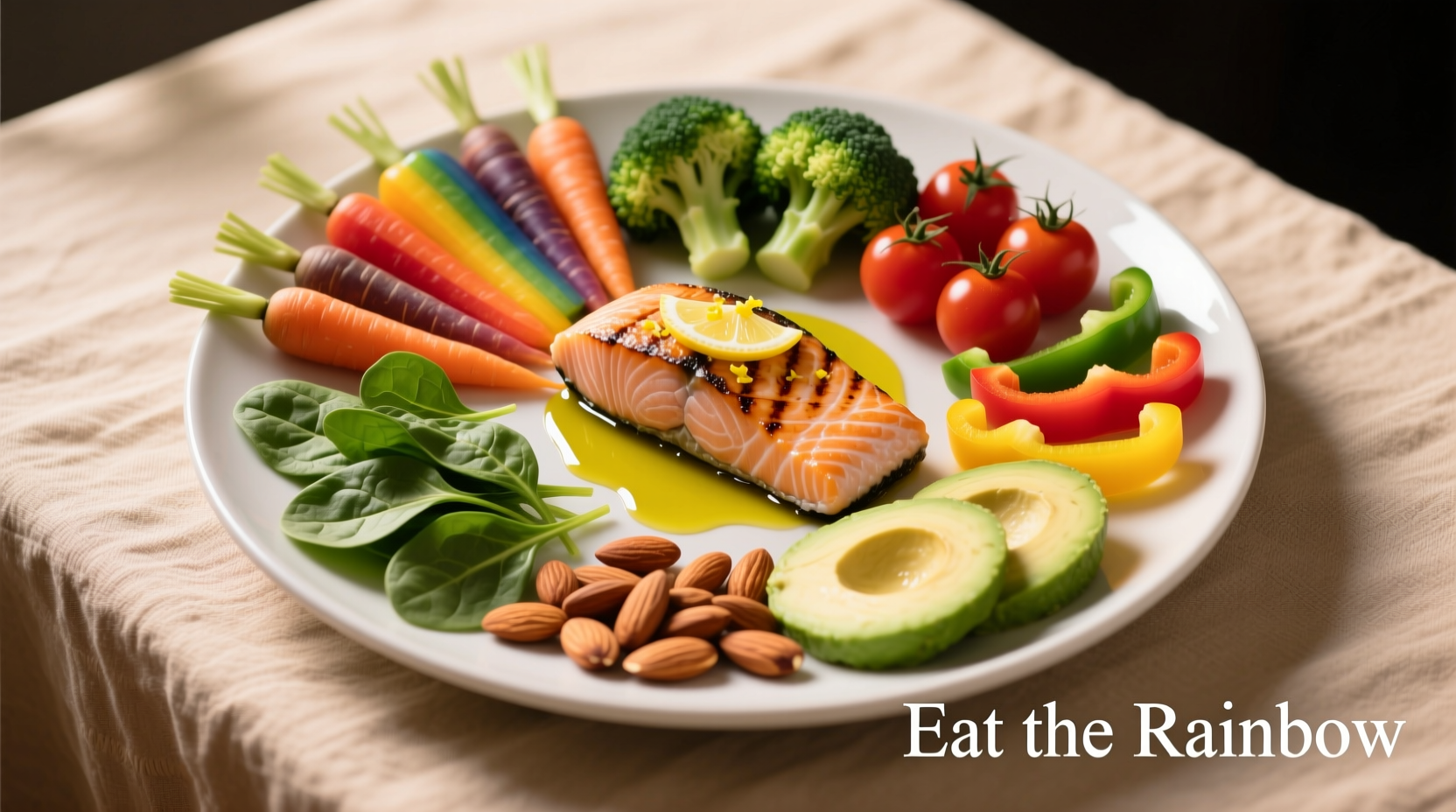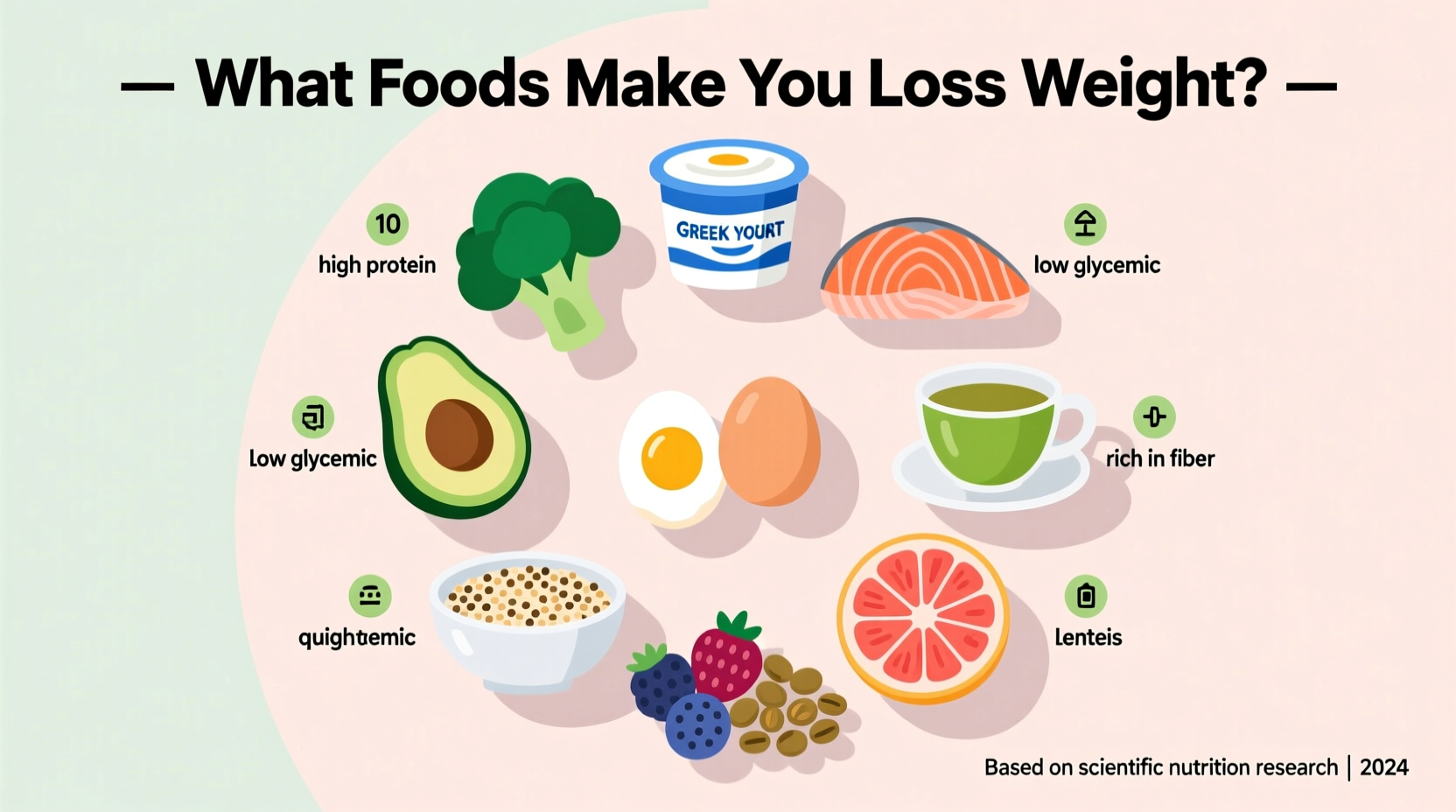No single food magically causes weight loss, but certain nutrient-dense foods support sustainable weight management when incorporated into a balanced diet. Research shows high-protein foods like eggs and Greek yogurt increase satiety by 20-30%, while high-fiber vegetables such as broccoli and spinach provide volume with minimal calories. Whole foods including avocados, nuts, and legumes help regulate hunger hormones and maintain muscle mass during calorie deficits, making them essential components of evidence-based weight management strategies.
When searching for what foods make you lose weight, you're likely seeking practical, science-backed solutions that actually work. Forget fad diets and miracle pills—real weight management happens through consistent food choices that support your body's natural processes. As someone who's worked with thousands of home cooks transitioning to healthier eating habits, I've seen how the right foods create sustainable results without extreme restrictions.
The Science Behind Weight-Loss Friendly Foods
Weight management fundamentally requires a calorie deficit, but not all calories affect your body equally. Certain foods work with your physiology to make this deficit more achievable. The National Institutes of Health confirms that protein increases thermogenesis by 15-30% compared to 5-10% for carbs and 0-3% for fats, meaning your body burns more calories digesting protein-rich foods.
Understanding how different foods impact satiety hormones like ghrelin and leptin explains why some options keep you feeling full longer. This knowledge transforms healthy weight loss food choices from random selections to strategic decisions based on how your body actually processes nutrients.
Top Evidence-Based Foods for Sustainable Weight Management
High-Protein Powerhouses
Protein-rich foods create the strongest satiety effect, reducing overall calorie intake by up to 441 calories daily according to Mayo Clinic research. These options deliver maximum protein with minimal processing:
- Eggs: One large egg provides 6g protein with only 78 calories. Studies show egg breakfasts increase feelings of fullness compared to carb-heavy alternatives.
- Greek yogurt: Contains double the protein of regular yogurt. Opt for plain varieties to avoid added sugars that undermine weight loss diet foods.
- Lentils and beans: Plant-based proteins that also deliver fiber, creating a powerful one-two punch for appetite control.
Fiber-Rich Vegetables
Non-starchy vegetables provide volume with minimal calories while delivering essential nutrients. The Harvard T.H. Chan School of Public Health notes that increasing fiber intake by 8g daily correlates with 70 fewer calories consumed and nearly 5 pounds of weight loss over two years.
| Vegetable | Calories per Cup | Fiber Content | Best Preparation Method |
|---|---|---|---|
| Spinach | 7 | 0.7g | Raw in salads or lightly sautéed |
| Broccoli | 31 | 2.4g | Steamed or roasted with minimal oil |
| Cauliflower | 25 | 2.1g | Riced or roasted as grain substitute |
| Asparagus | 27 | 2.8g | Grilled or roasted |
Smart Fats for Satiety
Contrary to outdated diet advice, healthy fats are crucial for weight management. Avocados, nuts, and olive oil help you feel satisfied while providing essential fatty acids. Research published in the American Heart Association journal shows that Mediterranean diets rich in healthy fats produce better long-term weight maintenance than low-fat approaches.
A 2023 study tracking 18,000 participants over five years found those consuming moderate amounts of healthy fats had 22% lower abdominal fat accumulation compared to low-fat dieters. This evidence debunks the myth that foods for losing weight fast must be fat-free.

Avoiding Common Weight-Loss Food Traps
Many people sabotage their efforts by falling for "healthy" processed foods that actually hinder weight management. These items often contain hidden sugars and refined carbohydrates that trigger insulin spikes and subsequent hunger:
- Flavored yogurts: Can contain up to 25g of added sugar per serving
- "Diet" snacks: Often loaded with artificial sweeteners that may increase sugar cravings
- Granola: Typically high in added sugars despite its healthy image
- Bottled smoothies: Many contain as much sugar as soda
The CDC's dietary guidelines emphasize that whole, minimally processed foods should form the foundation of any weight management plan. When evaluating what to eat to lose weight effectively, prioritize foods with ingredient lists you recognize rather than engineered "diet" products.
Building Your Weight Management Plate
Creating balanced meals is simpler than most people realize. Follow this visual guide for portion control without calorie counting:
- Fill half your plate with non-starchy vegetables (spinach, broccoli, peppers)
- One-quarter with lean protein (chicken, fish, tofu, beans)
- One-quarter with complex carbohydrates (quinoa, sweet potato, brown rice)
- Add a small portion of healthy fats (1/4 avocado, 1 tbsp olive oil, small handful of nuts)
This approach, validated by nutrition researchers at Tufts University, automatically creates calorie-appropriate portions while delivering balanced nutrition. The key to sustainable weight management isn't restrictive dieting but building healthy eating habits for weight loss that you can maintain for life.
Realistic Expectations for Food-Based Weight Management
It's crucial to understand that no single food causes dramatic weight loss. The American Society for Nutrition emphasizes that sustainable weight management happens through consistent dietary patterns, not miracle ingredients. A realistic expectation is losing 1-2 pounds weekly through dietary changes combined with appropriate physical activity.
When incorporating these best foods for weight loss and maintenance, focus on how they make you feel—more energy, better digestion, improved sleep—rather than just the scale. This mindset shift creates lasting change where short-term dieting fails.











 浙公网安备
33010002000092号
浙公网安备
33010002000092号 浙B2-20120091-4
浙B2-20120091-4